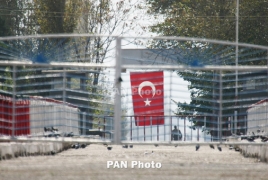
Minister of Economy Vahan Kerobyan believes Armenian businesses will feel the “positive effect” if the land border with Turkey opens.
“According to the information we have, regular air cargo flights aren’t being operated yet,” Kerobyan said in an interview with Armenpress when asked on the possible economic impact of Turkey lifting the ban on air trade with Armenia.
“And, to be honest, given the proximity of the countries it’s possible that there won’t be any [regular air cargo flights], because the land transport connection through Georgia is rather affordable. And at first glance, air [cargo] connection isn’t too attractive.”
However, he did not rule out that some products will be transported by air.
“Nevertheless, cargo is being transported via passenger flights too, which is basically a type of air cargo transport. There are no cargo planes yet, and perhaps there won’t be any. We aren’t too worried about that,” the minister added.
Asked on the economic impact of the possible opening of the land border with Turkey, Kerobyan said: “The opening of the border with Turkey will lead to a big economic growth, because the Turkish market and the opening of connections will give broad possibility, access in terms of shipping goods to both the Turkish market itself and to countries in the Middle East. All of this shouldn’t be viewed in a local, small picture. This is a small part of a larger picture. And if the geopolitical circumstances get arranged in our factor and eventually we reach that moment, then I am sure that all businesses in Armenia will feel the positive effect.”
Asked on the possible risks for Armenian manufacturers in conditions of the border being opened, the minister said that naturally there will be risks, but the government is carrying our serious work. As an example Kerobyan mentioned the “unprecedented” assistance given to process manufacturing enterprises and companies in a number of other sectors, so that the companies, using the possibilities given by the high economic growth, among others, will be able to modernize their business, digitize and upgrade their equipment and processes and become competitive companies with higher productivity.
“With last year’s data, we funded deals worth 56 billion drams, as a result of which 901 contracts were signed for the acquisition of new equipment for businesses,” Kerobyan said.

